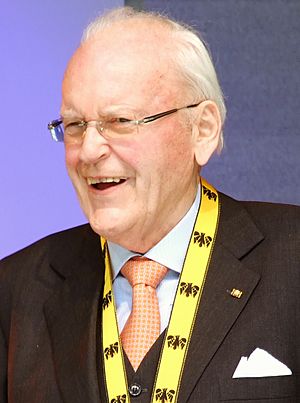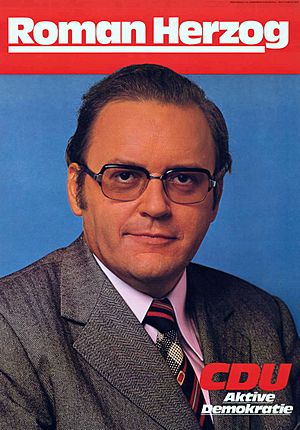Roman Herzog facts for kids
Quick facts for kids
Roman Herzog
|
|||||||||||||||||||||||||||||||||||||||||||
|---|---|---|---|---|---|---|---|---|---|---|---|---|---|---|---|---|---|---|---|---|---|---|---|---|---|---|---|---|---|---|---|---|---|---|---|---|---|---|---|---|---|---|---|

Herzog in 2012
|
|||||||||||||||||||||||||||||||||||||||||||
| President of Germany | |||||||||||||||||||||||||||||||||||||||||||
| In office 1 July 1994 – 30 June 1999 |
|||||||||||||||||||||||||||||||||||||||||||
| Chancellor | |||||||||||||||||||||||||||||||||||||||||||
| Preceded by | Richard von Weizsäcker | ||||||||||||||||||||||||||||||||||||||||||
| Succeeded by | Johannes Rau | ||||||||||||||||||||||||||||||||||||||||||
|
|||||||||||||||||||||||||||||||||||||||||||
|
|||||||||||||||||||||||||||||||||||||||||||
| Personal details | |||||||||||||||||||||||||||||||||||||||||||
| Born | 5 April 1934 Landshut, Bavaria, Nazi Germany (now Germany) |
||||||||||||||||||||||||||||||||||||||||||
| Died | 10 January 2017 (aged 82) Jagsthausen, Baden-Württemberg, Germany |
||||||||||||||||||||||||||||||||||||||||||
| Political party | Christian Democratic Union (1970–2017) | ||||||||||||||||||||||||||||||||||||||||||
| Spouses |
Christiane Krauß
(m. 1958; Alexandra Freifrau von Berlichingen
(m. 2001) |
||||||||||||||||||||||||||||||||||||||||||
| Children | 2 | ||||||||||||||||||||||||||||||||||||||||||
| Alma mater | Ludwig Maximilian University of Munich | ||||||||||||||||||||||||||||||||||||||||||
| Occupation |
|
||||||||||||||||||||||||||||||||||||||||||
| Signature | |||||||||||||||||||||||||||||||||||||||||||
Roman Herzog (5 April 1934 – 10 January 2017) was an important German politician, judge, and legal expert. He served as the President of Germany from 1994 to 1999. He was a member of the Christian Democratic Union (CDU) political party.
Herzog was the first president chosen after Germany became one country again in 1990, known as German reunification. Before becoming president, he was a judge at Germany's highest court, the Federal Constitutional Court. He even led this court as its president from 1987 to 1994. Before becoming a judge, he was a law professor.
Contents
Early Life and Education
Roman Herzog was born in Landshut, a town in Bavaria, Germany, in 1934. His family was Protestant, and his father worked as an archivist, managing important historical documents.
He decided to study law in Munich. In 1958, he finished his advanced studies with a special paper about Germany's Basic Law (its constitution) and the European Convention on Human Rights.
Herzog worked as an assistant at the University of Munich until 1964. He then became a professor in 1964. He taught at the University of Munich until 1966. After that, he taught constitutional law and political science at the Free University of Berlin. In 1969, he became a professor of public law at the German University of Administrative Sciences in Speyer. He was also the president of this university from 1971 to 1972.
Political Career and Public Service
Roman Herzog's journey in politics started in 1973. He worked as a representative for the state of Rhineland-Palatinate in the German federal government in Bonn.
From 1978, he served as the State Minister for Culture and Sports in the government of Baden-Württemberg. He then became a member of the Landtag of Baden-Württemberg (the state parliament) in 1980. After that, he took on the role of State Minister of the Interior.
Herzog was also very involved with the Evangelical Church in Germany. He led a special group for public responsibility until 1980. From 1982, he was a member of the church's main assembly, called the synod.
In 1983, Herzog was chosen to be a judge at the Federal Constitutional Court of Germany in Karlsruhe. This court is very important because it makes sure that laws follow Germany's constitution. From 1987 to 1994, he was the president of this high court.
Becoming President of Germany (1994-1999)
In 1993, the German Chancellor, Helmut Kohl, chose Roman Herzog as a candidate for the 1994 presidential election. The president is the head of state in Germany, representing the country.
Herzog was elected President of Germany on May 23, 1994. He was chosen by a special group called the Federal Assembly. He officially started his job as Federal President on July 1, 1994.
Important Moments as President
As president, Herzog took part in many important events. In 1994, he attended the 50th anniversary of the Warsaw Uprising. This was a brave fight by Polish people against the Nazi occupation during World War II. In a powerful speech, he honored the Polish fighters and asked for "forgiveness for what has been done to you by the Germans."
In 1995, Herzog was one of the few foreign leaders to attend a special Jewish service at the Auschwitz concentration camp. This was to remember the 50th anniversary of the camp's liberation. In January 1996, he made January 27 Germany's official day of remembrance for the victims of Hitler's terrible regime. He also spoke about the suffering of the Roma and Sinti under the Nazis, saying their persecution was just as bad as the terror against the Jewish people.
In April 1997, Herzog gave a famous speech in Berlin. He said that Germany needed to make social and economic changes more quickly. He felt the country was moving too slowly and risked falling behind other innovative economies.
In November 1998, the President's office officially moved from Bonn to Berlin. This made it the first federal office to move to the new capital city. Roman Herzog finished his five-year term as president on June 30, 1999. He did not seek to be re-elected. Johannes Rau became the next president.
After the Presidency
After his time as president, Herzog continued to be active. From 1999 to 2000, he led a group called the European Convention. This group helped create the Charter of Fundamental Rights of the European Union.
He also led a group in 2000 that looked into a financing issue affecting the CDU party. In 2001, he spoke about biotechnology and the use of embryonic stem cells for research. He believed that a complete ban on this research might be too much, especially if it could help children with serious illnesses.
In 2003, Herzog led a commission to suggest new ideas for social welfare reform. This was in response to Chancellor Gerhard Schröder's "Agenda 2010" plan.
Roman Herzog passed away on January 10, 2017, at the age of 82.
Other Activities
Roman Herzog was involved in many different organizations and foundations. Here are a few examples:
- Friedrich-August-von-Hayek-Stiftung, Chairman of the Board of Trustees (1999–2013)
- Hertie-Stiftung, Honorary Chairman of the Board of Trustees
- Konrad Adenauer Foundation, Chairman of the Board of Trustees
- Dresden Frauenkirche, Member of the Board of Trustees
- German Cancer Research Center (DKFZ), Member of the Advisory Board
- 2006 FIFA World Cup Organizing Committee, Member of the Board of Trustees (2005–2006)
Awards and Recognition
Roman Herzog received many honors and awards for his work. Some of these include:
- 1994: Grand Cross of the White Rose of Finland with Collar
- 1996: Honorary Doctorate from the University of Oxford
- 1997: Charlemagne Prize from the City of Aachen (a very important European award)
- 1997: Decoration of Honour for Services to the Republic of Austria
- 1998: Honorary Citizenship of the City of Berlin
- 1999: Honorary Citizenship of his hometown, Landshut
- 2002: Order of Merit of Baden-Württemberg
Personal Life
Roman Herzog was married to Christiane Herzog. She passed away in 2000. In 2001, he married Alexandra Freifrau von Berlichingen. He had two children.
He was a member of the Evangelical Church in Germany. He died on January 10, 2017, at the age of 82.
Images for kids
See also
 In Spanish: Roman Herzog para niños
In Spanish: Roman Herzog para niños
 | Roy Wilkins |
 | John Lewis |
 | Linda Carol Brown |


